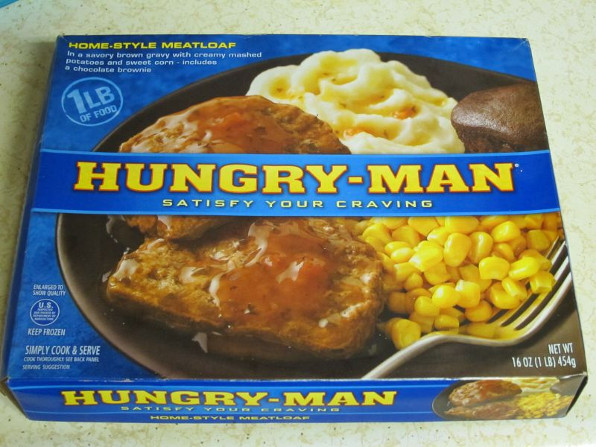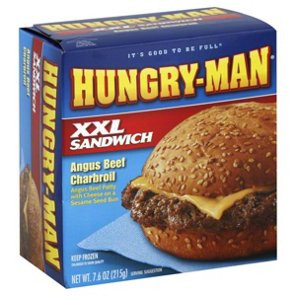A new study from the University of Liverpool suggests that we in the west, who consume vast quantities of packaged foods, eat too much, at least partly because manufacturers portion their wares in too-large sizes. Dr. Obvious says, that’s partly because we’ve been taught to clean our plates…
 An example of a packaged food product which actually uses large portions as a selling point.
An example of a packaged food product which actually uses large portions as a selling point.
The brand is targeted specifically to ‘big guys with big appetites’, but construction
workers and other ‘big guys’ aren’t the only ones who buy the product.
Researchers at the University of Liverpool recently published a study in the American Journal of Clinical Nutrition suggesting folks eat too much because packaged food manufacturers sell their products in over-size portions – portions that are too large to be healthy. Historical increases in the portion sizes of commercially available food products are known to cause ‘passive’ overeating (we’ve been taught to clean our plates) and have been linked to the emergence of the worldwide obesity crisis.
What they did…
Subjects in the experiment were first served, at random, smaller or larger sizes of the same meal: Quiche and Salad. Participants were advised the experiments were part of a ‘food, mood, and reasoning’ study as to not alert them to the real aim of the experiment which could have a detrimental effect. Then, they were asked to serve themselves. The portion sizes they were served or chose in the each round were closely monitored. A week later, participants were asked what their preferred portion size had been.
What they found…
The results from all three experiments showed that being served a smaller portion of food resulted in participants changing their perception of what a normal portion size was, and this resulted in participants choosing to eat less food in future. But the change only lasted a short time, until participants encountered larger portion sizes again.
Study spokesperson Dr. Inge Kersbergen, said: “It is unclear from our research how long the effect would last for. The effects we observed were larger when we examined food intake the next day in the laboratory than when we looked at portion size preference one week later. Based on the idea that our immediate environment influences our perceptions of what a normal portion size is, it is likely that the effect would only last if we encounter smaller portion sizes more often than supersized portions.”
Which leads to their conclusion…
Spokesperson Dr. Eric Robinson said: “There have been suggestions that shrinking the portion size of commercially available food products could be one approach to reducing over-consumption and tackling population-level obesity. The present findings indicate that if portion sizes of commercially available foods were reduced, these smaller, more appropriate portion sizes may recalibrate perceptions of what constitutes a “normal” amount of food to eat and, in doing so, decrease how much consumers choose to eat.”
Thank you, Doctor Obvious!
Why the large portions in the first place?
I say packaged food manufacturers offer large portions to reassure buyer that they’re getting their money’s worth, and to ensure that consumers literally ‘get their fill’, equating those conditions to customer satisfaction. Calories and health don’t enter into it.
But there are many studies already out there which demonstrate that reduced calorie intake can not only prevent obesity, but also yield positive effects toward other common diseases. Some say, lowering your calorie intake can literally extend your life.
My take…
Here in the west, people tend to over-eat, anyway, because we have so much food available. It’s food abuse, yes. But it’s also a way of life. This tendency may be part of our ancestral memory, dating back to hunter-gatherer times when you ate all you could of what food was available, because, tomorrow, you might go hungry.
I don’t think consumers ‘in the wild’ will react the same way study participants did, under the rigid, artificial study conditions. And I don’t think packaged food manufacturers will voluntarily reduce portion sizes and risk alienating their customers.
Which brings us back to the phenomenon of product downsizing, and how ticked off people get when they realize they’re paying the same price for less food…
~ Maggie J.

